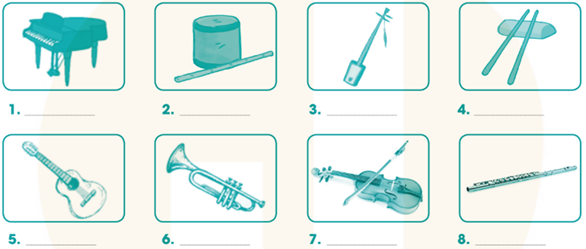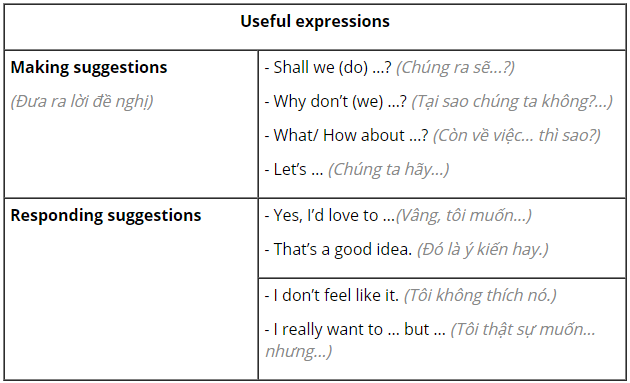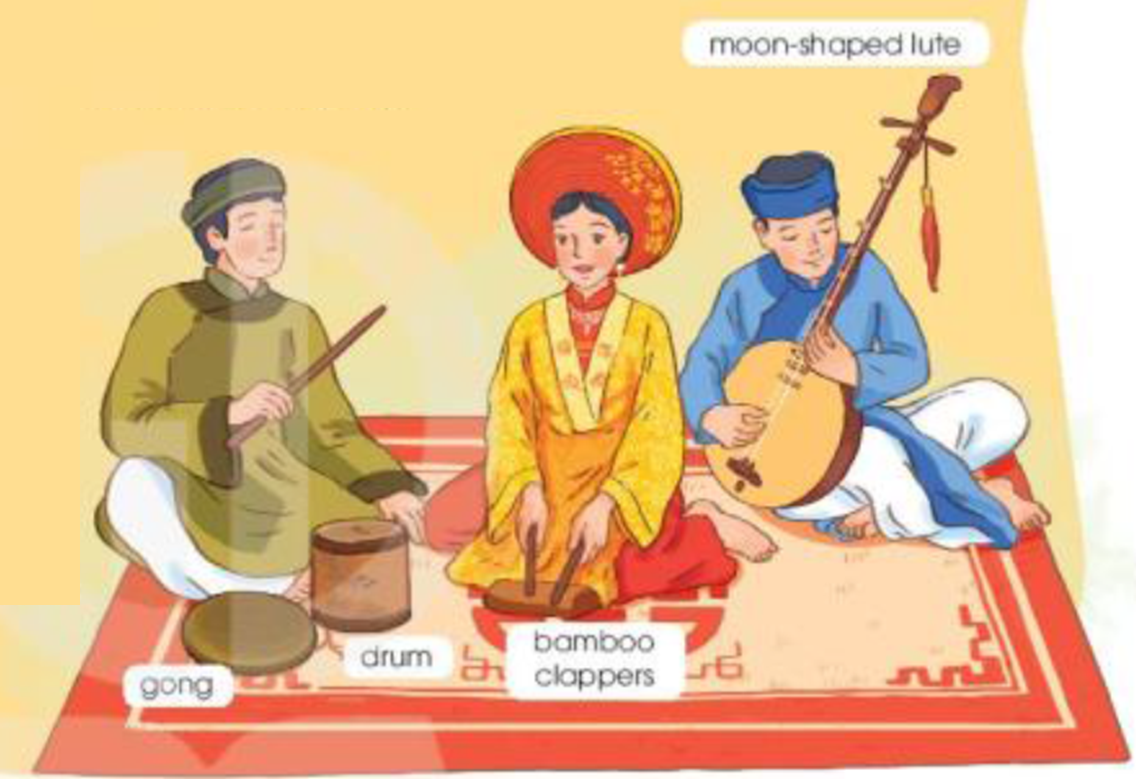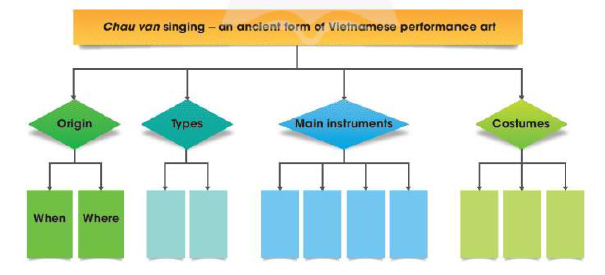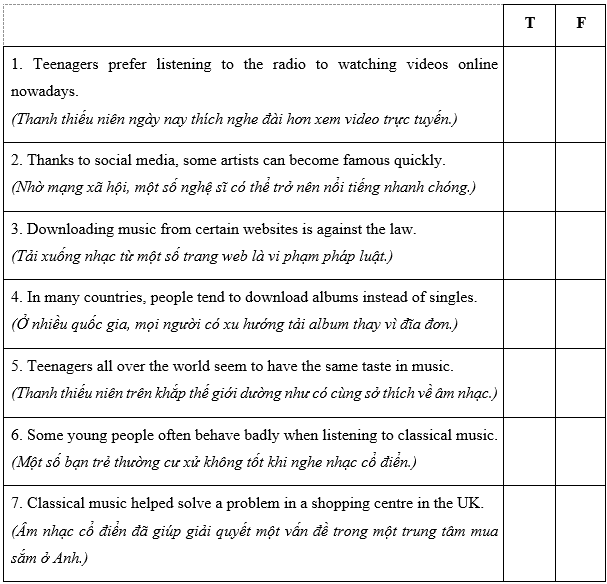Giải SGK, SBT Unit 3. Music Global Success
Giải SGK, SBT Unit 3 Global Success
4. Match the two parts to make complete sentences.
(Nối hai phần để tạo thành câu hoàn chỉnh.)
|
1. This artist didn’t go to a music school, |
a. and he has received several awards. |
|
2. His beautiful songs have helped |
b. to upload his cover song videos on social media. |
|
3. His mother started |
c. bring more love into people’s lives. |
|
4. He is a talented artist, |
d. but he learnt to play musical instruments by himself. |
Stress in two-syllable words
(Trọng âm các từ có 2 âm tiết)
1. Listen and repeat. Pay attention to the stressed syllable in each word.
(Nghe và lặp lại. Chú ý đến các âm tiết nhận trọng âm ở mỗi từ.)
|
Stress on the first syllable |
Stress on the second syllable |
|
singer programme common careful |
relax perform attract decide |
Music (Âm nhạc)
1. Match the words with their meanings.
(Nối các từ với nghĩa của chúng.)
|
1. perform (v) |
a. having a natural ability to do something well |
|
2. judge (n) |
b. a music recording that has one song |
|
3. audience (n) |
c. to dance, sing or play music in order to interest or please people |
|
4. talented (adj) |
d. a person who decides on the results of a competition |
|
5. single (n) |
e. the people who watch, read or listen to the same thing |
2. Read a text about a famous music show. Match the highlighted words and phrases in the text to the meanings below.
(Đọc một văn bản về một chương trình ca nhạc nổi tiếng. Nối các từ và cụm từ được đánh dấu trong văn bản với các nghĩa bên dưới.)
![]() American Idol was shown for the first time on television in January 2002. At that time, there were many movies and TV series, but no reality competitions on TV. The participants in this programme are ordinary people who the audience can really identify with.
American Idol was shown for the first time on television in January 2002. At that time, there were many movies and TV series, but no reality competitions on TV. The participants in this programme are ordinary people who the audience can really identify with.
![]() First, judges travel all around America in search of the best singers and bring them to Hollywood. Twenty-four to thirty-six participants are then chosen to go on to the next stages where they perform live on TV, and receive the judges’ opinions. From the semi-final onwards, people over 13 and living in the US, Puerto Rico or the Virgin Islands can vote for their preferred singers online or through text messaging. The singer with the lowest number of votes is eliminated. On the final night, the most popular singer becomes the winner of that American Idol season.
First, judges travel all around America in search of the best singers and bring them to Hollywood. Twenty-four to thirty-six participants are then chosen to go on to the next stages where they perform live on TV, and receive the judges’ opinions. From the semi-final onwards, people over 13 and living in the US, Puerto Rico or the Virgin Islands can vote for their preferred singers online or through text messaging. The singer with the lowest number of votes is eliminated. On the final night, the most popular singer becomes the winner of that American Idol season.
![]() People watch American Idol not only to see the participants sing, but also hear the comments of the judges, who play an important role in the competition. Their different opinions and interesting arguments make the show very exciting.
People watch American Idol not only to see the participants sing, but also hear the comments of the judges, who play an important role in the competition. Their different opinions and interesting arguments make the show very exciting.
![]() The first season of Vietnam Idol was shown in 2007. It included three stages: short performances to choose participants, semi-finals and finals. The winners of the show’s different seasons have become famous singers in Viet Nam.
The first season of Vietnam Idol was shown in 2007. It included three stages: short performances to choose participants, semi-finals and finals. The winners of the show’s different seasons have become famous singers in Viet Nam.
|
1. series |
a. feel that they are similar to and can understand them |
|
2. identify with |
b. a set of TV or radio programmes on the same subject |
|
3. in search of |
c. removed from the competition |
|
4. eliminated |
d. looking for |
2. Listen to an interview about preparations for an International Youth Music Festival. Tick (✓) the information that you hear in the recording.
(Nghe một bài phỏng vấn về việc chuẩn bị cho Lế hội âm nhạc thanh niên quốc tế. Đánh dấu thông tin mà em nghe được trong bài ghi âm.)
|
A. Location (Vị trí) |
|
|
B. Guests (Khách mời) |
|
|
C. Decoration (Trang trí) |
|
|
D. Tickets (Vé) |
|
3. Listen again and decide whether the following statements are true (T) or false (F).
(Nghe lại và quyết định xem những câu sau đây là đúng (T) hay sai (F).)
|
|
T |
F |
|
1. This is the first International Youth Music Festival. (Đây là Liên hoan Âm nhạc Thiếu niên Quốc tế đầu tiên.) |
|
|
|
2. The organisers have finished preparations for the festival. (Ban tổ chức đã chuẩn bị xong cho lễ hội.) |
|
|
|
3. Last year, the festival was held on the beach. (Năm ngoái, lễ hội được tổ chức trên bãi biển.) |
|
|
|
4. They are selling tickets for the festival at the park gates. (Họ đang bán vé cho lễ hội ở cổng công viên.) |
|
|
|
5. The country park is far from the town centre. (Công viên nước cách xa trung tâm thị trấn.) |
|
|
2. Work in groups. Put the words and phrases in the box below into the appropriate columns. Some words and phrases can go into more than one column.
(Làm việc nhóm. Đặt các từ và cụm từ trong hộp bên dưới vào các cột thích hợp. Một số từ và cụm từ có thể đặt ở nhiều hơn một cột.)
|
amazing excited relaxed stadium watch fireworks take photos play musical instruments |
friendly beach wonderful fun play games see art exhibitions |
|
Location |
Atmosphere |
Activities |
Feeling |
|
|
|
|
|
Complete the text using the words in the box.
(Hoàn thành đoạn văn sử dụng các từ trong hộp.)
| artists music concerts instruments fans |
Our class survey revealed some surprising results about the students’ (1) ______ habits. Most of them did not hesitate to say that they love music because they find it relaxing. Their favourite music is K-pop and British or American pop music as they are big (2) _______ of Korean and American (3) ______. Fourteen out of twenty students play a musical (4) _______ and most of them practise between one and three hours a week. Going to (5) ______ is usually popular among teenagers, but only eight people said that they like going to such music events.
1. Match the two parts to make complete sentences.
(Nối 2 phần với nhau để tạo thành câu hoàn chỉnh.)
|
1. She writes her own songs, (Cô ấy viết các bài hát của riêng mình,) |
a. or we can stay at home to watch the final night at Vietnam Idol. (hoặc chúng ta có thể ở nhà để xem đêm chung kết tại Vietnam Idol.) |
|
2. He participated in many talent competitions, (Anh ấy đã tham gia nhiều cuộc thi tài năng,) |
b. so we decided to walk to the stadium. (vì vậy chúng tôi quyết định đi bộ đến sân vận động.) |
|
3. We can go to a live concert at City Theatre, (Chúng ta có thể đi xem một buổi hòa nhạc trực tiếp tại Nhà hát Thành phố,) |
c. and they always have deep meanings. (và chúng luôn mang những ý nghĩa sâu sắc.) |
|
4. The traffic was really bad, (Giao thông thực sự tồi tệ,) |
d. but the judges never liked his songs. (nhưng ban giám khảo không bao giờ thích các bài hát của anh ấy.) |
Choose the correct letter (A, B, C or D) to indicate the word that differs from the other three in the position of primary stress.
(Chọn chữ cái đúng (A, B, C hoặc D) để chỉ ra từ khác với ba từ còn lại ở vị trí của trọng âm chính.)
|
1. A. singer 2. A. common 3. A. compose 4. A. talent 5. A upload 6. A. weather 7. A. become 8. A. theatre |
B. receive B. music B. careful B. artist B. theatre B. birthday B. idol B. movie |
C. programme C. people C. second C. award C. receive C. boring C. comment C. famous |
D. lyrics D. perform D. album D. famous D. guitar D. expect D. season D. attend |
3. Label the following musical instruments.
(Ghi nhãn các dụng cụ âm nhạc sau đây.)
|
guitar piano drum trumpet flute clappers lute violin |
